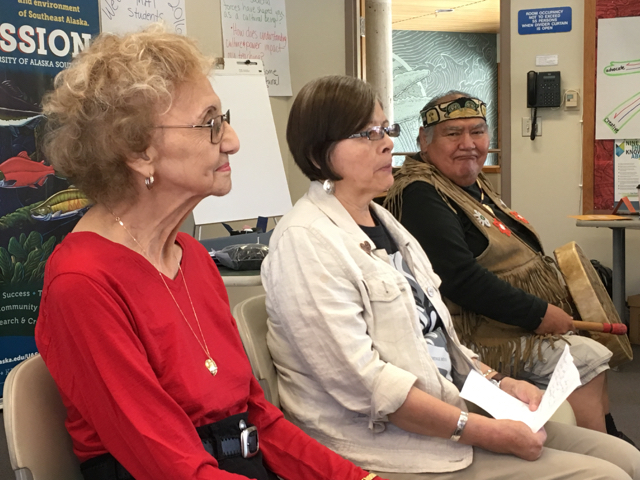I am so grateful for the words shared by our elders, Linda Belardi, Selina Everson and David Katzeek today. There is so much they shared about their life experiences and world view that is directly related to and vitally important for anyone who intends to teacher in Alaska’s schools.
The advice Linda share that resonated with me the most was in regards to the 10 Common Principles by the Coalition of Essential Schools (essentialschoools.org). Linda touched on three of these 10 principles:
- Teach children to use their minds well.
- Personalization – Know your students.
- Schools should have a tone of decency and trust.
Each of these principles feel essential to the teaching profession. As an aspiring science teacher the first principle, teach children to use one’s mind well, is especially applicable. Encourage students to question everything and to provide evidence to support their thoughts and opinions.
Personalization is important in the decision course content and delivery in such a way to create an engaging and safe classroom environment for all. This can only be done well after there is an understating of who your students are, where they are from, the culture that shapes them.
The third principle Linda share, Schools should have a tone of decency and trust, ties to one of the Southeast Alaska four cultural values Wooch. Yax – Balance, Reciprocity and Respect. Within the framework of this Multicultural Education course I feel this is at the core of transformative approach I hope to bring to the classroom.
Selina Everson shared her powerful and heartbreaking life experiences as an individual who experienced the direct impact of boarding schools. Selina and her siblings were a part of a generation stripped of their language who, then in an effort to spare their own children from that pain, did not teach their own children the language. I have heard these feelings of guilt expressed by many indigenous speakers, including my own grandmother. It is this generation that is also a part of the current resurgence of Native culture and language in Alaska. That even after the traumatic events of their lives, still believe and teach respect for all people and all cultures.
David Katzeek shared so much! His passion for the education and encouragement of youth is inspiring. Two themes David reiterated were of building confidence in students and the characteristics of some of his greatest teachers.
David’s words,
“How much my grandparents loved me to plant that seed of knowledge in me. To help me feel good about myself – that is the essence of education”
speak to the importance of acknowledging student’s ability to do and learn anything as a powerful message, that many children do not hear often enough. This acknowledgement of the individual and the belief in the child is something I hope to convey in such a compelling way as expressed by David.
The first characteristic of great teachers David shared were that of great orators or storytellers. Storytellers connect you to what you are learning about and make you a part of the story. Drawing students in and engaging them in the content. The second characteristic David did not explicitly state, but alluded while contrasting his academic survival of high school to his success at the collegiate level. David credits his success to his college professors allowing him to apply what he already knew, drawing on his background as a strength instead of a deficit.
I appreciated the words of all our elders shared with a cohort of aspiring teachers. Especially the words of encouragement as we take on a challenging, but reward profession.
“The most important thing for me. Do all that you can do to build confidence in another human being. Tell them that they are okay, that they are all right, that there is nothing, absolutely nothing, that they can’t learn. It’s not easy, but it’s fun.”


